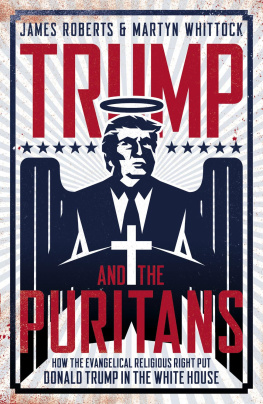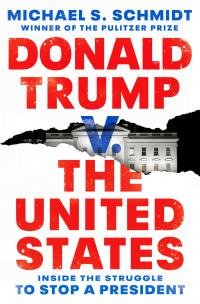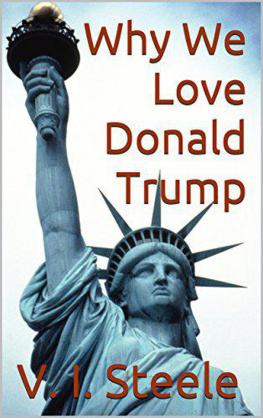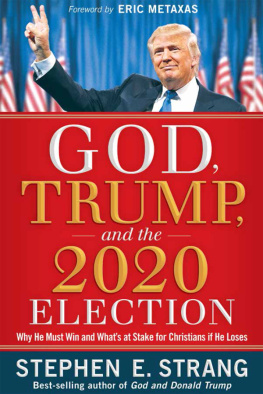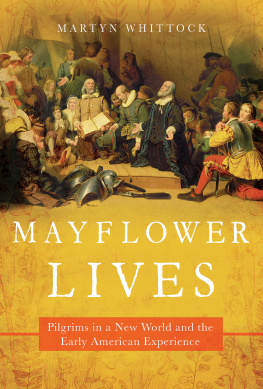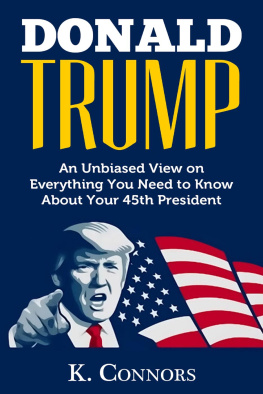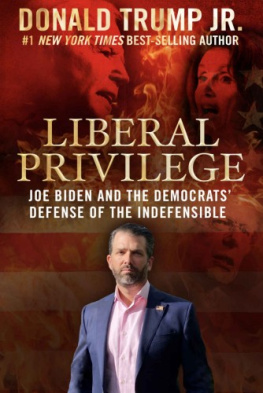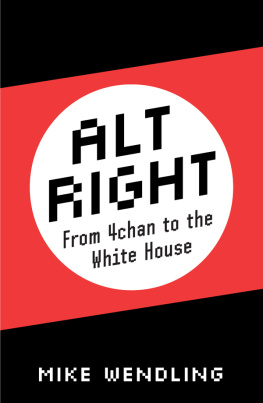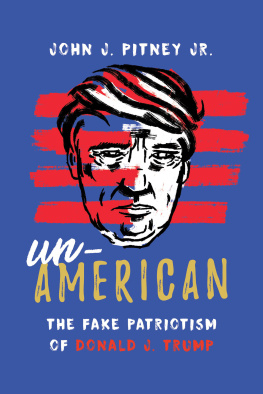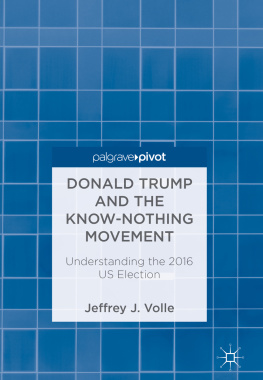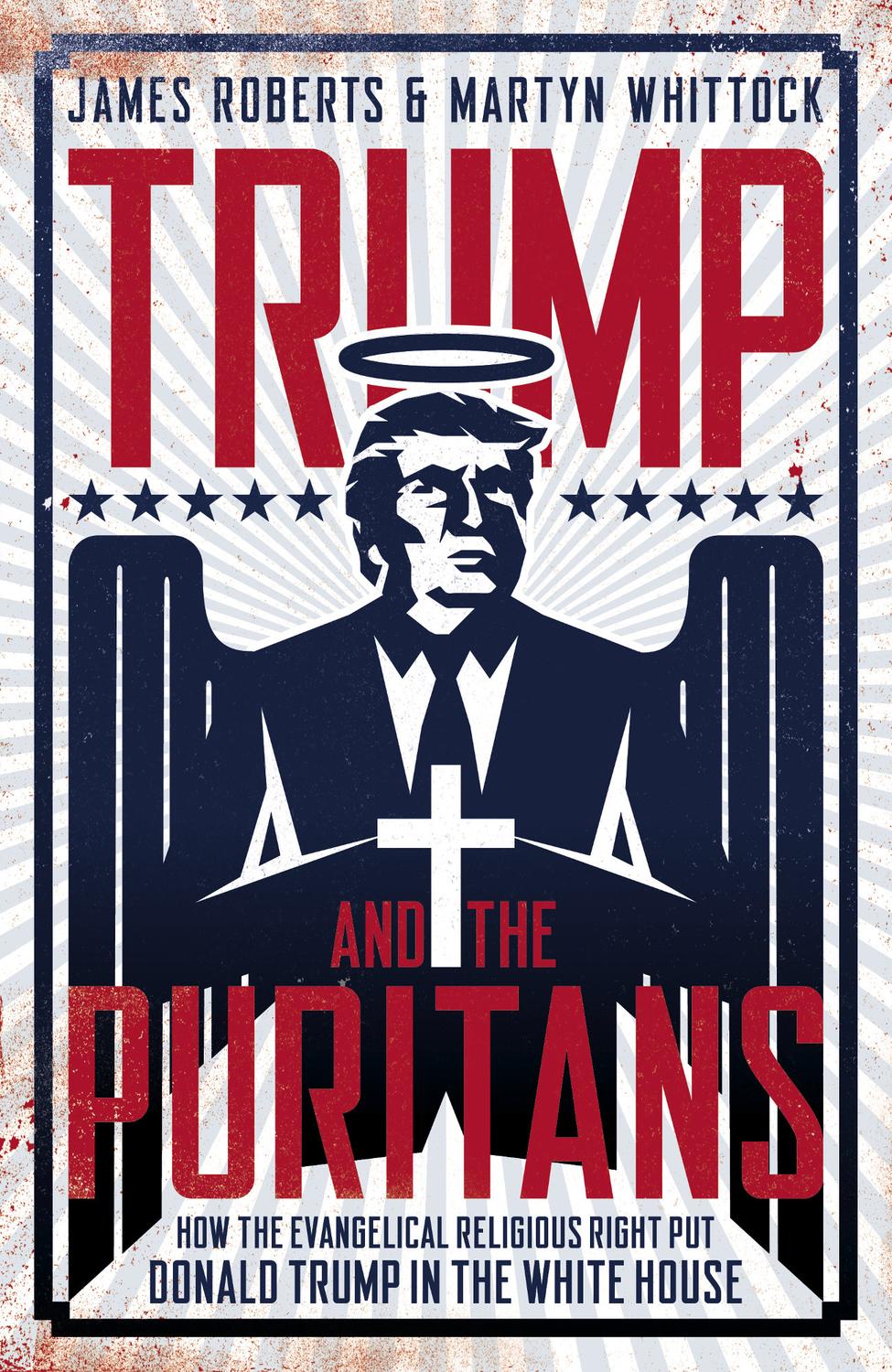ix
W e are grateful to many people who assisted in the writing and production of this book. We wish to especially thank Ali Hull, with whom we first discussed the connection between Trump and the Puritans over an animated lunch at Clevedon, on the Somerset coast; and James Macintyre, whose introduction made this possible.
James: I would especially like to thank: Glenn Edwards, photographer together we have seen the worst. Colleagues and friends, disputatious yet congenial: Brendan Walsh, Alban McCoy, Clifford Longley, Christa Pongratz-Lippitt, David Harding, Mike Holland, Catherine Pepinster, Ruth Gledhill, Liz Dodd, Maggie Fergusson, Christopher Lamb, Iain Millar, Joanna Moorhead, Rose Gamble, Ignatius Kusiak, Guy Keleny, Isabel Gribben, Pippa Lee, Marcus Tanner and Raymond Whitaker. My wife Remi, who knows the last shall be first.
Martyn: I would like to especially thank my wife Christine, for her never-failing support, interest, patience and willingness to listen to my latest ideas. And our daughters Hannah and Esther, who x have been members of many an animated discussion and whose interest in politics and theology greatly inform such conversations.
We also wish to thank Robert Dudley, our agent, Olivia Beattie and James Lilford and the team at Biteback for all of their advice, encouragement and support.
xi
T he Trump phenomenon is often described as the US version of a populist trend that has impacted on many areas of contemporary global politics. Exploring it is a key part of understanding the modern world and its complexity. As the US gears up for the 2020 presidential election and as the polarisation of US politics increases the nature of this phenomenon, its origins, its impact on the USA and its long-term effects are the subjects of analysis, speculation and heated debate. We hear it and read it via the broadcast news, in our newspapers, across the internet and on social media. Again and again people ask: What is going on in the USA? Why is it happening?
Despite the global political similarities, Donald Trumps success is also rooted in a peculiarly American experience, since a very large and influential part of his support base lies among Christians of the so-called evangelical religious right. The influence of US evangelical Christians on national politics has never been more pronounced than it is today. From the appointment of Supreme Court judges, to US relations with Israel, from support for the wall, xii to abortion legislation, the power of this extraordinary lobby is seen in the changing politics and policies of the nation. In this, religious faith has an impact that is quite unique to the USA among 21st-century Western states; and it stands in comparison with the impact of Islam in other countries. There is clearly something distinctive about US culture and politics that sets it apart from comparatively developed democratic societies and states.
Remarkably, 2020 is not only the year of the next US presidential election, it is also the 400th anniversary of the arrival of the Mayflower Pilgrims in North America and the beginnings of Puritan New England. In addition, both the election and anniversary occur in the month of November. Is this mere coincidence, synchronicity or a providential arrangement of events? While readers will have their own opinions, there are clearly those in the modern USA who would consider this juxtaposition of dates as being something more than mere random chance. To them, Gods providence is shaping the pattern of modern history. But, regardless of differing conclusions reached concerning the significance of the autumnal coming together of events in 2020, there is undeniably an historical link between the origins of Puritan settlement of North America and the remarkable events that have shaken the nation since 2016. What is going on in the modern USA has very deep roots. They are roots that stretch back into the almost mythological origins of the nation in the seventeenth century.
That is the contention of this book. The evidence we explore reveals how the original Puritan settlers (at Plymouth Colony and, especially, in Massachusetts Bay Colony) contributed something undeniably potent to the development of the eventual United xiii States, which emerged in the eighteenth century, expanded in the nineteenth and became a superpower in the twentieth. In the twenty-first century, modern America is still negotiating a way through the legacy of these events of 400 years ago. And this is so, despite the huge ethnic, demographic, political, constitutional, cultural and religious changes that have occurred in the intervening years. In short, huge numbers of US voters are still, in effect, doing Puritan politics.
As a result, this book provides an exploration of one of the most important forces driving the support for Donald Trump, which is delivering millions of election-winning votes: Americas Puritan heritage. Support for Trump among evangelicals is the latest manifestation of this key strand within the cultural DNA of the USA. As a direct result, the long-term influence of the Puritans makes the USA different to any other Western democracy; it motivates and energises a key part of the Trump base; and it has played a major role in delivering political power to the President.
Our exploration will bring together historic evidence and the latest journalistic analysis. The Mayflower Compact meets the tweets of @realDonaldTrump and New England Puritan ideology meets the political goals of modern evangelical conservatives. It is through untangling these ancient narratives and tracing their path through four centuries of history that we can begin to understand that, while aspects of the Trump phenomenon can be compared to wider global developments, what is occurring is still unique to the modern United States.
We believe that anyone wanting to fully understand what is currently happening in the USA must take this into account if they are xiv to fully appreciate what is going on. Trump and the Puritans takes readers from the formative years of the seventeenth century to the remarkable events that have led to the current situation in the USA.
In carrying out this exploration we are grateful to a huge range of people, sources, assessments and evidence streams, which have made this possible. We have endeavoured to formally identify our sources in our endnotes. We have also attempted to be fair and balanced in a field of politics that has become increasingly heated over recent years. We hope that we have achieved this and that readers will gain a deeper (and historically more connected) insight into this crucial area of US politics. It goes without saying that all errors are our own.
James Roberts
Martyn Whittock
AN IDEA THAT WENT BADLY WRONG
I n the US presidential election year of 2004, The Guardian dreamed up a scheme to recruit thousands of readers to persuade American voters in swing states to reject sitting President George W. Bush and vote, instead, for the Democratic candidate, Senator John Kerry. Operation Clark County would involve recruiting 50,000 readers to write letters to voters in Clark County, Ohio. In 2000, Bush defeated Democrat Al Gore in the tightest of races. Four years later

